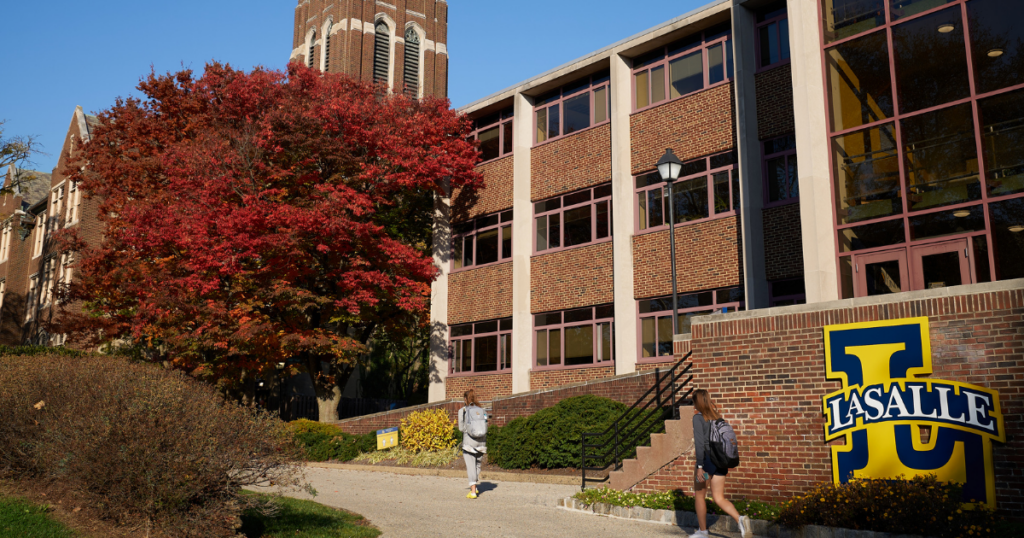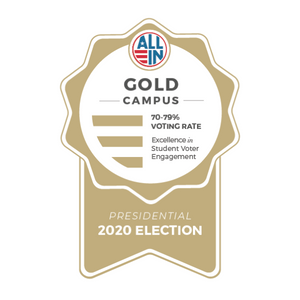
In 2020 election, University students exceeded the national voting rate.
Three out of every four eligible voters within La Salle University’s student population headed to the polls for the 2020 U.S. presidential election—a figure that exceeded the voting rate among their campus peers across the country.
At La Salle, 76 percent of eligible student-voters cast their ballots during the November 2020 election. Nationally, the college voting rate among eligible students was 66 percent. This also marks a 17.4-percent increase in presidential election participation in 2016, when 58.6 percent of eligible La Salle students voted.
These data are from a report by the National Study of Learning, Voting, and Engagement, from Tufts University’s Institute for Democracy and Higher Education (IDHE). The report analyzed voting data from nearly 1,200 colleges and universities throughout the United States.
Voter participation among University students, in part, can be attributed to a campus-wide initiative called La Salle Votes!, said Regina Gauss Kosiek, director of university ministry at La Salle. The initiative features collaboration between students, faculty, and staff to share election awareness and voting resources.
“At La Salle, we foster a culture of engagement and encourage our students’ dedication to strengthening our democracy,” Gauss Kosiek said. “Civic activism is an important piece of the La Salle tradition. Finding ways to continue that tradition in light of COVID-19 and virtual study was a challenge, but the faculty, staff and students of La Salle Votes! used their enthusiasm and creativity to reach students wherever they were with information and programs about the 2020 election cycle. Voting is a habit and I’m glad to know so many students have started that habit during their time at La Salle.”
 In addition, La Salle received a gold seal from the ALL IN Campus Democracy Challenge for achieving a student voter participation rate between 70–79 percent in the 2020 presidential election. The ALL IN Challenge is a national non-partisan initiative that strives for civic learning, political engagement, and voter participation among college students.
In addition, La Salle received a gold seal from the ALL IN Campus Democracy Challenge for achieving a student voter participation rate between 70–79 percent in the 2020 presidential election. The ALL IN Challenge is a national non-partisan initiative that strives for civic learning, political engagement, and voter participation among college students.
These figures support La Salle students’ reputation for high civic engagement and election participation. Earlier this year, La Salle received a voter-friendly campus designation from two nonpartisan organizations—the Campus Vote Project and NASPA-Student Affairs Administrators in Higher Education.
Nationwide, the study’s authors report a record-breaking set of findings. On campuses across the country, students built on the momentum swing of 2018 and voted at high rates in the 2020 election, with voter turnout jumping to 66% in last year’s presidential election. The 14 percentage point increase, from 52% turnout in the 2016 election, outpaces that of all Americans, which jumped 6 percentage points from 61% to 67%, according to the U.S. Census Bureau.
“That students, often younger and first-time voters, turned out at rates commensurate with the general public is nothing short of stunning,” said Nancy Thomas, who directs Tufts’ Institute for Democracy and Higher Education. “We attribute this high level of participation to many factors, including student activism on issues such as racial injustice, global climate change and voter suppression, as well as increased efforts by educators to reach students and connect them to the issues and to voting resources.”
IDHE’s National Study of Learning, Voting, and Engagement is the nation’s largest study of college and university student voting. Nearly 1,200 campuses of all types participate in the opt-in study. They range from community colleges and research universities, to minority-serving, state, and private institutions. The dataset reflects all 50 states and the District of Columbia.
—Christopher A. Vito